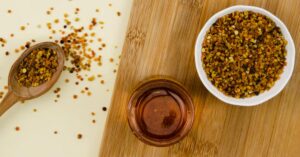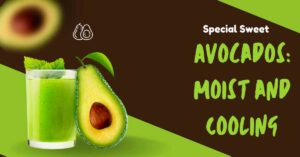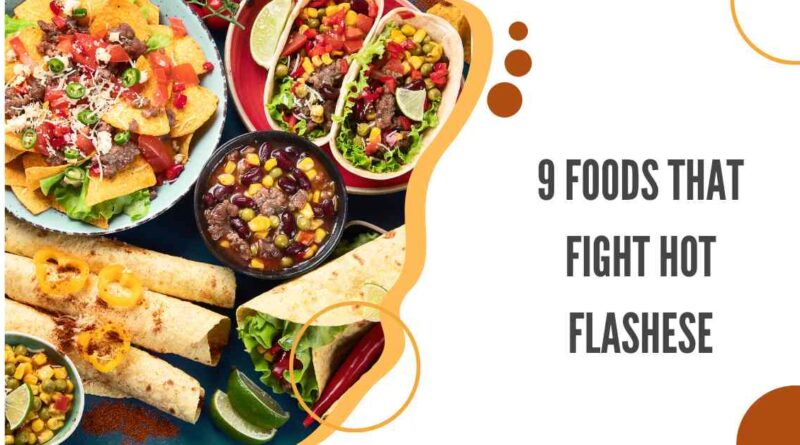9 Foods That Fight Hot Flashes
Introduction
Hot flashes can be really awful, especially during menopause. These waves of heat come at times when one may finish speaking on the phone and find themselves drenched in sweat, and then after this, they are utterly disheveled and need so much comfort. Although there are so many treatments these days, have you ever known that your diet can also help out with hot flashes? Here are the top 9 foods that fight hot flashes. These natural remedies will help you cool down and seek comfort without going on medication alone.
Soy: Nature’s Hot Flash Fighter
Soy contains many phytoestrogens, which have a strong resemblance to estrogen in the body and can help level out one’s hormone levels. Estrogen is often allowed to decrease slowly, so that brings on hot flashes. Consuming soy-based foods often relieves these symptoms. Find out how nine natural foods reduce hot flashes and learn the benefits of using Bright Heart Health for general health.
- Excellent sources include tofu, edamame, and soy milk.
- Evidence shows women who eat soy every day have fewer hot flashes.
- It’s a vegan solution that may be easily inserted into any diet.
Flaxseeds: Omega-3 Treated

Flaxseeds are small but a powerhouse in combating hot flashes. They are loaded with omega-3 fatty acids and lignin’s that can influence the hormonal balance and alleviate inflammation, both of which can contribute to your menopausal symptoms.
You can sprinkle it over your cereal, yogurt, or smoothies.
Lignin’s in flaxseed can mimic estrogen in your body.
Very good for your heart health, and by improving digestion
Omega-3 Fatty Acid-Rich Cold-Water Fish
Fish like salmon, mackerel, and sardines are high in omega-3 fatty acids, which regulate inflammation, and hot flashes become less frequent and less intense.
- Omega-3s are known to regulate hormone levels.
- Cold-water fish are also good for the heart and brain.
- Easy to add it to your weekly meals when grilling or baking.
Berries: Antioxidant Powerhouses
Berries, especially blueberries and strawberries, contain antioxidants that lessen inflammation. Antioxidants can help dissipate oxidative stress, which is a causative factor in hot flashes.
- They are high in vitamins and low in calories.
- Antioxidants may help safeguard the cells during the menopause transition.
- They provide a delicious snack or add some healthy toppings to your breakfast.
Leafy Greens: Nutrient-Rich Relief

Spinach, kale, and all other leafy greens are rich in vitamins and minerals, with magnesium helping to regulate body temperature and minimizing occurrences of hot flashes.
- Rich in magnesium, it can soothe the nerves and muscles.
- They are a rich source of fiber and boost health and general well-being.
- They may easily be integrated into any salad, smoothie, or food accompaniment.
Whole Grains: Fiber for Balance
Whole grains such as oats, quinoa, and brown rice contain both fiber and B vitamins. These are both very important for the management of hormones. Fiber helps lower blood sugar levels and consequently minimizes hot flash causes.
- B vitamins act as energizers as well as facilitators of hormone health.
- They are also supportive of heart health and digestion.
- One can add them at different stages of food preparation; for instance, one might add some in the morning and some at dinner time.
Nuts: A Hormone Helper
Nuts, mainly almonds and walnuts, are resourceful in healthy fats, fiber, and magnesium. All these nutrients have effects that enhance the stability of moods, manage stress, and minimize hot flashes.
- Magnesium helps in stress reduction; thus, the occurrences of hot flashes decrease.
- Nuts contain proteins and healthy fats to keep the energy going.
- A great snack taken on the go or included in salads.
Avocados: Moist and Cooling

Avocados are full of healthy fats and vitamin E. These foods aid in regulating hormones and could help reduce hot flashes. The monounsaturated fats found in avocados assist in cooling down the body.
- Vitamin E is associated with reduced hot flashes and night sweats.
- Healthy fats tend to be good for hormone health in general.
- There are many ways to enjoy avocados. They can be tossed into salads, blended into smoothies, or spread on toast.
Citrus Fruits: Vitamin C Boost
Oranges, lemons, and grapefruits belong to the category of citrus fruits rich with vitamin C and antioxidants. Vitamin C and other antioxidants reduce inflammation and oxidative stress that cause hot flashes.
- Vitamin C boosts the immune system and protective flora of the skin.
- Citrus fruits are also hydrating, an essential need when experiencing hot flashes.
- Juicy snacks go well with water and in salads.
What Foods Stop Hot Flashes?
Some foods have been reported to make a woman’s body feel cooler and stop hot flashes naturally. By introducing such foods to your diet, the severity and reoccurrence of hot flashes could be reduced.
- Soy: Filled with phytoestrogens that mimic estrogen, thus keeping the hormones balanced.
- Flaxseeds: Supplying omega-3s and lignin’s, which keep down inflammation and balance hormone levels.
- Cold-water fish: a source of omega-3 fatty acids, which will help keep the body’s temperature and hormone level in check.
Which vitamin is best suited for hot flashes?

Vitamins are the backbones for managing hot flashes, but some work better than others in reducing the symptoms.
- Vitamin E: It helps to curb the hot flash symptoms by regulating the amount of estrogen.
- Vitamin D: It interacts with the overall body to regulate hormones, causing fewer hot flash symptoms.
- Vitamin B6: It helps to level out mood swings and reduce hormonal fluctuations; therefore, it reduces hot flashes.
What fruit can one consider best for hot flashes?
High-water-content fruits and fruits that are high in antioxidants can prove pretty effective in cooling down the body and thus help in reducing the severity of hot flashes.
- Berries: Such fruits contain abundant amounts of antioxidants, which would help in diminishing the occurrence of inflammation and oxidative stress.
- Citrus fruits: fruit that is rich in vitamin C and helps hydrate the body while decreasing the severity of hot flashes.
- Apples: Rich in fiber and antioxidants, they can regulate blood sugar and prevent the triggers of hot flashes.
Foods to Avoid Hot Flashes

While some foods tend to reduce hot flashes, others may cause or exacerbate them. Avoid foods that can increase body heat and hormone imbalances.
- Hot foods raise body temperature and can exacerbate hot flashes.
- Caffeine stimulates the nervous system, which can lead to hot flashes.
- Alcohol dilates blood vessels and may increase the frequency and intensity of hot flashes.
How to Stop Hot Flashes Fast Naturally
In the event of an immediate hot flash, there are different self-cooling mechanisms without medicines:
- Hydration: Drinking cold water to cool down your body instantly
- Deep breathing: Slow, deep breathing that will relax your body and aid in lowering your body heat.
- Cool atmosphere: With a fan or even a cold pad to lower your body heat caused by the hot flash
Conclusion
Not always. The solution may be on your plate. Introducing you to the 9 hot flash-fighting foods that can be included in your diet to reduce their frequency and intensity. A balanced, nutrient-rich diet should support hormonal balance, making the menopausal transition easier. Feel the comfort and difference in well-being by trying them.




